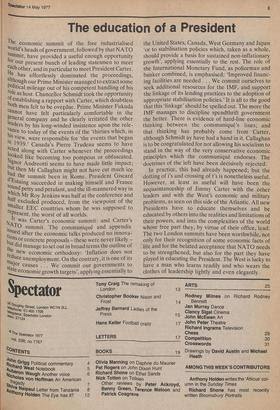The education of a President
The economic summit of the free industrialised world's heads of government, followed by that NATO s 8,11lomit, have provided a useful enough opportunity Or our present bunch of leading statesmen to meet c,aeh other, and in particular to meet President Carter. rle has effortlessly dominated the proceedings, although our Prime Minister managed to extract some Political mileage out of his competent handling of his rOle as host. Chancellor Schmidt took the opportunity establishing a rapport with Carter, which doubtless D0th men felt to be ovetdue. Prime Minister Fukuda cannot have felt particularly comfortable in the Pneral company and he clearly irritated the other leaders by his long-winded insistence upon the relevha:nee to today of the events of the 'thirties which, in .ISview, were responsible for 'the events that began m 1939: Canada's Pierre Trudeau seems to have acted along with Carter whenever the proceedings
oked like becoming too pompous or obfuscated.
nOr Andreotti seems to have made little impact; io_ut then Mr Callaghan might not have cut much ice ]a, d the summit been in Rome. President Giscard u tstaing succeeded in making himself and France s°1Ind petty and petulant, and the ill-mannered way in
hich Mr Roy Jenkins was half at the conference and nalf excluded produced, from the viewpoint of the !loaner EEC countries whom he was supposed to lepresent, the worst of all worlds.
N h was Carter's economic summit: and Carter's ATO summit. The communiqué and appendix ,s.stled after the economic talks produced no innova.: ku°11s or concrete proposals —these were never likely — tuhut did manage to set out in broad terms the outline of new economic orthodoxy: 'Inflation does not 'nice unemployment. On the contrary, it is one of its ajor causes . . . We commit our governments to tate economic growth targets', applying essentially to
the United States, Canada, West Germany and Japan 'or to stabilisation policies which, taken as a whole, should provide a basis for sustained non-inflationary growth', applying essentially to the rest. The role of the International Monetary Fund, as policeman and banker combined, is emphasised: 'Improved financing facilities are needed. . . We commit ourselves to seek additional resources for the IMF, and support the linkage of its lending practices to the adoption of appropriate stabilisation policies.' It is all to the good that this 'linkage' should be spelled out. The more the IMF manages to discipline spendthrift government the better. There is evidence of hard-line economic thinking between the communiqué's lines; and that thinking has probably come from Carter, although Schmidt ay have had a hand in it. Callaghan is to be congratulated for not allowing his socialism to stand in the way of the very conservative economic principles which the communiqué endorses. The doctrines of the left have been decisively rejected.
In practice, this had already happened; but the dotting of i's and crossing of t's is nonetheless useful. However, at least as useful will have been the acquaintanceship of Jimmy Carter with the other leaders and with the West's economic and military problems, as seen on this side of the Atlantic. All new Presidents have to educate themselves and be educated by others into the realities and limitations of their powers, and into the complexities of the world whose free part they, by virtue of their office, lead. The two London summits have been worthwhile, not only for their recognition of some economic facts of life and for the belated acceptance that NATO needs to be strengthened, but also for the part they have played in educating the President. The West is lucky to have a man who learns readily and who wears the clothes of leadership lightly and even elegantly.


































 Previous page
Previous page